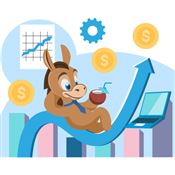Seeking Alpha vs Motley Fool
Seeking Alpha and Motley Fool's stock picks both outperform the market. But they're aimed at different investors. Learn which is right for you.
 |
- Is Seeking Alpha or Motley Fool Better?
- What Is Seeking Alpha and How Does It Work?
- What Is Motley Fool and How Does It Work?
- Seeking Alpha vs. Motley Fool's Returns
- Premium Subscription: Is Seeking Alpha or Motley Fool More Expensive?
- What You Get with Seeking Alpha and Motley Fool
- What are the differences between Motley Fool Stock Advisor and Seeking Alpha Premium?
- Seeking Alpha and Motley Fool's Plans and Other Products
Knowing what stocks to invest in is challenging for experienced traders. New investors risk losing large sums of money as they learn the basics.
And you'd have to quit your job to keep track of all the latest investment info.
That's where a stock-picking service can help.
Seeking Alpha and Motley Fool are two of the most popular options.
This guide compares the pricing, features, and pros and cons of Seeking Alpha and Motley Fool. Read on to learn their differences and see which platform is right for you.
Is Seeking Alpha or Motley Fool Better?
Motley Fool Stock Advisor is better for new investors. This is for you if you don't have time to read stock analyses and you just want someone to tell you where to invest.
On the other hand, Seeking Alpha Premium is better if you're a research-driven investor who wants to make your own investment decision.
Shown below is a summary of the comparison.
| Seeking Alpha Premium | Motley Fool Stock Advisor | |
|---|---|---|
| Who It's Best For | Intermediate Investors | New Investors |
| Rate of Return | 4x the S&P returns | 4x the S&P returns |
| Articles | Technical and in-depth | Light and easy-to-read |
| Key Features | Top-rated stocks, stock ratings, financial statements, factor grades, technical content | 2 stock picks per month, 10 Best Buys Now, buy/sell/hold recommendations, stock reports |
| Pros | Helps investors at various levels, computer-generated stock rating | Saves research time, beginner-friendly |
| Cons | Content can be overwhelming, some articles aren't high quality | Constant upsells, some unprofitable stock picks |
| Customer Ratings (in Trustpilot) *The highest rating is 5 | 4.2 ⭐ | 3.7 ⭐ |
But there's much more to learn if you are looking for the right stock-picking service.
What Is Seeking Alpha and How Does It Work?
Seeking Alpha is an investment research platform showcasing crowdsourced stock analysis and stock-picking tools. David Jackson, who previously worked as an investment researcher, launched the platform in 2004.
This is best for investors who want to do their own research. Seeking Alpha's premium plan provides stock ratings and screeners to help you pick stocks.
Seeking Alpha's community of investors also share their insights on why they bought or sold a stock. Seeking Alpha's editors then curate this content to ensure quality.
Knowing what the investing community thinks is beneficial. This helps you weigh the pros and cons of investing in a company.
Basically, Seeking Alpha empowers you to make your own investment decisions. It does this by:
- Informing you of what other investors think
- Providing you with objective metrics to screen and choose stocks
If choosing your own stocks sounds too advanced, you may like Motley Fool's service instead.
What Is Motley Fool and How Does It Work?
Motley Fool is an investment advisory platform providing stock recommendations and analysis. Brothers Tom and David Gardner founded Motley Fool in 1993.
Motley Fool is best for new investors with little time to do their own research. The platform essentially does the research for you.
The platform also provides articles that can help you learn more about investing. Its team writes all the articles of expert analysts.
Motley Fool Stock Advisor is its flagship premium plan. This premium subscription provides you with two stock recommendations each month.
Stock Advisor - $99/year for New Members
*$99 is an introductory price for new members only. 50% discount based on current list price of Stock Advisor of $199/year. Membership will renew annually at the then-current list price.
Seeking Alpha vs Motley Fool: Returns
Regarding the rate of return, does Seeking Alpha or Motley Fool perform better?
- Motley Fool Stock Advisor's recommended stocks have an average annualized return of 727% since its inception in 2002. In comparison, the S&P 500's average return is only 161% as of July 22, 2024.
- Seeking Alpha's Quant Rating "Strong Buy" ranked stocks have a total cumulative return of 1,734% compared to the S&P 500's 369% over a 12-year period.
That means if you invested in Motley Fool's top-rated stocks instead of the S&P 500, your profit would have been multiplied slightly over 4 times.
And if you invested in Seeking Alpha's top-rated stocks instead, your profit would have been multiplied 4 times.
Both Seeking Alpha and Motley Fool have an impressive track record of beating the market. But there are other factors to consider, and a big one is the cost.
Remember: Past performance doesn't mean they will have the same future performance.
Seeking Alpha vs Motley Fool: Costs
Seeking Alpha is more expensive than the Motley Fool Stock Advisor.
Seeking Alpha's premium subscription costs $299/yr, while the Stock Advisor only costs $199/yr.
New members, however, can get a discount for the first year. Check out the Seeking Alpha deals below.
$75 Off Alpha Picks
- Two data-driven stock picks each month to hold long-term
- Alerts when ratings shift to Sell and when new picks are added
- The stock picks cover multiple sectors
- Access to all Alpha Picks (over 20 stocks) on day 1
$159 Off Alpha Picks + Premium Bundle
Premium's full price is $299 per year. Alpha Picks' is $499. Get both popular products for just $639 for your first year. That's a discount of $159.
In any case, this pricing comparison may prove to be pointless. That's because what you get from the two premium plans is very different. Read on to know the difference.
What You Get with Seeking Alpha and Motley Fool
Seeking Alpha and Motley Fool's premium subscriptions gives you the tools you need to choose investments.
Both platforms are best used for individual stock investing, though they also offer resources for other assets, such as index funds.
Here's a comparison of their features:
| Seeking Alpha Premium | Motley Fool Stock Advisor | |
|---|---|---|
| 2 Stock Picks per Month | Additional Fee | ✔ |
| 10 Best Buys Now Picks | ✔ | |
| Stock Ratings (Quant Rating, SA Authors Rating, Wall Street Rating) | ✔ | |
| Factor Grades | ✔ | |
| Financial Statements from Past 10 Years | ✔ | |
| Authors' Stock Performance | ✔ | |
| Stocks Recommendations | ✔ | ✔ |
| Stock Screeners | ✔ | ✔ |
| Stocks Reports | ✔ | ✔ |
| Instant Alerts | ✔ | ✔ |
| Online Community of Investors | ✔ | ✔ |
- Stock Recommendations
With Motley Fool's Stock Advisor, you get 2 fresh stock picks each month. These are delivered straight to your inbox. This is very useful if you're someone who doesn't have time to do your research.Aside from that, Motley Fool also offers you a list of its past and present stock recommendations. This includes a list of 10 stocks rated as Best Buys Now.
Seeking Alpha Premium also provides recommendations through its list of top-rated stocks. These stocks are rated based on Seeking Alpha's Quant Rating System, Authors' Ratings, and Wall Street Analysts' Ratings.
Seeking Alpha Premium does not provide 2 monthly stock picks, unlike Motley Fool. However, an upgrade to Alpha Picks will give you just that.
What is Seeking Alpha's Alpha Picks?
Alpha Picks sifts through Seeking Alpha's long list of "Strong Buy" stocks and picks just two. This product is similar to the Motley Fool Stock Advisor. Premium members can get these two monthly stock picks.[4] But that's on top of the premium subscription fee. - Stock Ratings and Screeners
Seeking Alpha and Motley Fool both offer stock screeners. But only Seeking Alpha has stock ratings.Seeking Alpha offers stock ratings that are unlike any in the market. Its Quant Ratings and SA Authors' Ratings give you an objective and subjective view of a stock's profitability.
The SA Authors' Ratings are based on the average subjective rating of the platform's contributors. In contrast, the Quant Ratings are based on the objective quant analytics system of Seeking Alpha. This Quant system removes human biases on the stock rating.
In terms of stock screeners, Motley Fool screens stocks through the conviction rating of its analysts, while Seeking Alpha has predefined screeners, such as a list of Top Stocks by Quant, Top Growth Stocks, and Top Dividend Stocks.
Read about the best stock advisor websites. - Stock Analysis and Informative Content
Motley Fool and Seeking Alpha both analyze why a certain stock has a good or bad rating. They both tell you why you should ignore or invest in a particular stock.Both platforms offer informative content. However, Seeking Alpha's articles can be overwhelming and too technical.
Motley Fool and Seeking Alpha both offer free stock market news and educational resources. They provide free access to articles that teach about investment and investing ideas. However, Motley Fool has more free content than Seeking Alpha. - Financial Statements and Factor Grades
Seeking Alpha's Premium plan allows you to access each company's financial statements from the past 10 years. These statements are not available in Motley Fool.Another feature that's unique to Seeking Alpha are the 5 "factor" grades:[5]
- A company's valuation
- Growth
- Momentum
- Profitability
- Earnings per share revision
You would want to consider buying stocks with high factor grades.
Motley Fool doesn't provide company financial statements or factor grades. But it does provide stock reports (only for selected stocks) to help you improve your portfolio. This is another reason you may want to consider Seeking Alpha.
Read more about the best investment websites. - A company's valuation
- Instant Alerts
Seeking Alpha and Motley Fool both give you instant alerts. You receive email alerts when there's news that might impact your portfolio.These alerts can keep you up-to-date on your investments without constantly checking the platforms. But some users do find them annoying as they can quickly flood your inbox.
Of course, you can always filter and customize your alerts.
Motley Fool's email settings let you enable and disable the various email options. Seeking Alpha also lets you pick and choose which of their many emails you want to receive. - Investment Community
Both platforms foster community.Seeking Alpha's Premium members can interact with each other by posting comments on articles.
Motley Fool's Premium members can also interact with each other through community forums. These online discussion boards share additional insights from investors like yourself about investment news and strategies.
You'll definitely gain a lot from both subscriptions, despite their differences.
Motley Fool Stock Advisor vs Seeking Alpha Premium: Differences
Seeking Alpha Premium and the Motley Fool Stock Advisor differ in various ways. Aside from the differences in features discussed above, they primarily differ in four ways:
- Target Audience
Motley Fool and Seeking Alpha cater to different audiences.Motley Fool speaks more to beginner investors, while Seeking Alpha is best for intermediate or research-driven investors.
Both platforms cater to investors who need help in picking stocks. The only difference is Motley Fool does the picking for you. So it's best for those who don't want to do their own research.
On the other hand, Seeking Alpha is for investors who want to decide for themselves.
- Contributors and Content
Motley Fool's content is relatively light and beginner-friendly. In contrast, Seeking Alpha's articles are more in-depth and number-heavy.Seeking Alpha's contributors come from its pool of Premium subscribers. You can see the performance of the contributors' recommendations through its Authors' Stock Performance feature.
On the other hand, Motley Fool's contributors are its in-house team of hand-picked analysts. Motley Fool describes its analysts as "award-winning."
Motley Fool's name was inspired by the court jester, or Fool, in William Shakespeare's As You Like It. This Fool was not afraid to speak the truth and did it with humor. Similarly, the Motley Fool speaks the truth about investing in a fun and light manner. - Other Assets
In addition to individual stock picks, Motley Fool provides resources for ETFs and index funds.Seeking Alpha provides resources for more assets too. These include commodities, index funds, ETFs, and cryptocurrencies.
- Email Alerts
Seeking Alpha sends daily emails regarding your portfolio's pre-market summary. It's based on yesterday's performance and shares your portfolio's top gainers and losers.You can also get multiple emails with breaking news headlines and analyses. These are all related to what's in your portfolio.
Motley Fool also sends you daily emails regarding portfolio-related news or price updates.
But they also send you plenty of marketing emails urging you to upgrade to their other offerings.
If you're unsure about these premium stock-picking services, they offer other plans.
Seeking Alpha and Motley Fool's Plans
Seeking Alpha and Motley Fool offer various subscription plans and other services. The tables below show the pricing and description for each.
Seeking Alpha Plans[6]
| Pricing | Description | |
|---|---|---|
| Basic Plan | Free | Limited access to content but unlimited access to stock prices and Wall Street Analysts' Ratings |
| Premium Plan | $299/yr | List of top-rated stocks with Quant Ratings and SA Authors' Ratings |
| PRO Plan | $2400/yr | Everything in Premium including: Top Ideas, idea screener/filter, PRO content, VIP customer service |
| Alpha Picks | $499/yr | Two new stock recommendations each month |
$75 Off Alpha Picks
- Two data-driven stock picks each month to hold long-term
- Alerts when ratings shift to Sell and when new picks are added
- The stock picks cover multiple sectors
- Access to all Alpha Picks (over 20 stocks) on day 1
Motley Fool Overview of All Services
| Subscription | Pricing (per year) | Suggested Portfolio Size | Key Features |
|---|---|---|---|
| Stock Advisor | $199 | $25,000+ | 2 picks/mo; Monthly rankings in Stock Advisor; 3 entry strategies across Cautious, Moderate, and Aggressive styles; GamePlan |
| Epic | $499 | $50,000+ | 5 picks/mo; Monthly recommendations and rankings from Rule Breakers, Hidden Gems, and Dividend Investor; Cautious, Moderate, and Aggressive with specific stock allocation; Fool IQ; GamePlan+; Quant 5Y |
| Epic Plus | $1,999 | $100,000+ | 9 picks/mo; Monthly recommendations and rankings across Trends, Value Hunters, and Global Partners; Tom Gardner's real money portfolios in Moneymakers; Ongoing trades in Options |
| Fool Portfolios | $3,999 | $250,000+ | 11+ picks/mo; All of Tom Gardner's real money portfolios; Additional real money portfolios managed by numerous advisors; Monthly recommendations and rankings across Firecrackers and Digital Explorers |
| Fool One | $13,999 | $500,000+ | 11+ picks/mo; Access to the One Portfolio with quarterly rebalancing; Access to all Reports; Preferred access to Member Events and in-person experiences; Regular in-depth industry research reports in addition to the full universe of company and market coverage. |
Stock Advisor - $99/year for New Members
*$99 is an introductory price for new members only. 50% discount based on current list price of Stock Advisor of $199/year. Membership will renew annually at the then-current list price.
Epic - Stock Picks, Reports, Rankings, and More for $299
Use Coupon Code EPICSALE to Instantly Take $200 Off Motley Fool Epic
*$299 discounted offer based on $499/year list price. Introductory promotion for new members only.
Bottom Line: Which Is Right for You?
Seeking Alpha Premium and Motley Fool Stock Advisor cater to varying types of investors.
Motley Fool is best for new investors while Seeking Alpha is best for research-driven investors.
So what kind of investor are you?
Stock Advisor - $99/year for New Members
*$99 is an introductory price for new members only. 50% discount based on current list price of Stock Advisor of $199/year. Membership will renew annually at the then-current list price.
If you're a research-driven investor like me, our bias is clearly toward Seeking Alpha. I'm also a trader who leans on technical analysis, so Seeking Alpha's technical content really speaks to me.
On the other hand, Motley Fool is a good option if you're new to investing and prefer expert recommendations on which stocks to buy.
References
- ^ Seeking Alpha. Premium, Retrieved 09/16/2024
- ^ Motley Fool. Motley Fool Premium Services, Retrieved 07/22/2024
- ^ Motley Fool. Motley Fool Return Policy, Retrieved 05/08/2024
- ^ Seeking Alpha. Alpha Picks, Retrieved 3/22/2023
- ^ Seeking Alpha. Quant Ratings and Factor Grades FAQ, Retrieved 4/17/2024
- ^ Seeking Alpha. Subscription Plan Pricing, Retrieved 3/22/2023
Stock Advisor - $99/year for New Members
*$99 is an introductory price for new members only. 50% discount based on current list price of Stock Advisor of $199/year. Membership will renew annually at the then-current list price.
$20 Investment Bonus
- Open an Acorns account (new users only)
- Set up the Recurring Investments feature
- Have your first investment be made successfully via the Recurring Investments feature
Write to Del Exconde at feedback@creditdonkey.com. Follow us on Twitter and Facebook for our latest posts.
Note: This website is made possible through financial relationships with some of the products and services mentioned on this site. We may receive compensation if you shop through links in our content. You do not have to use our links, but you help support CreditDonkey if you do.
|
|
| ||||||
|
|
|
Compare:










